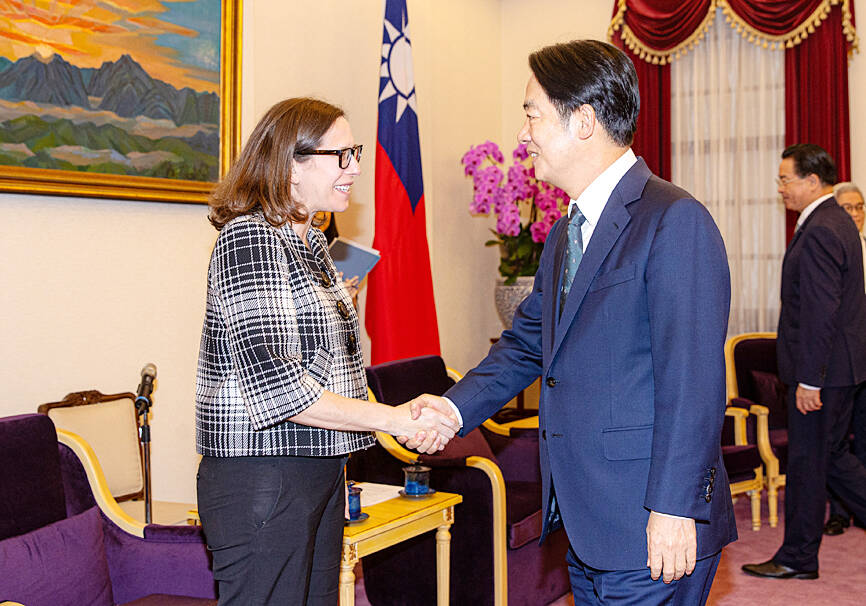The US has welcomed president-elect William Lai’s (賴清德) commitment to maintaining the “status quo,” American Institute in Taiwan Chair Laura Rosenberger said on Friday in an online interview with a US think tank.
Relations with the incoming administration were in good shape, Rosenberger said to the Foreign Policy Research Institute, which held the virtual event to mark the 45th anniversary of the Taiwan Relations Act (TRA).
“I’ve had the opportunity twice in two trips since the elections to engage with president-elect Lai and members of his team, to make sure again that we are in a solid place to continue the work going forward,” she said, referring to visits she made in January and this month.

Photo: CNA
“He’s been really clear in terms of his policy priorities, including his commitment to maintaining the status quo, which we, of course, very much welcome,” Rosenberger said on her conversations with Lai.
The TRA was signed into law on April 10, 1979, by then-US president Jimmy Carter after it was enacted by the US Congress a month earlier, in response to the US breaking off diplomatic ties with Taiwan.
“The TRA to my mind has provided a foundation for really everything we are doing to broaden and deepen the relationship,” she said, praising it as “a very insightful and prescient piece of legislation.”
Rosenberger said the TRA was not only about commitments to ensure Taiwan maintains sufficient self-defense capacity, but also “that the US should maintain the capacity to resist any resort to force or other forms of coercion.”
“I think that’s an important commitment. And you see the US continuing to do work, both ourselves and with allies and partners in the region, to reinforce deterrence in the Indo-Pacific to maintain that critical peace and stability across the Taiwan Strait,” she said.

CHANGING LANDSCAPE: Many of the part-time programs for educators were no longer needed, as many teachers obtain a graduate degree before joining the workforce, experts said Taiwanese universities this year canceled 86 programs, Ministry of Education data showed, with educators attributing the closures to the nation’s low birthrate as well as shifting trends. Fifty-three of the shuttered programs were part-time postgraduate degree programs, about 62 percent of the total, the most in the past five years, the data showed. National Taiwan Normal University (NTNU) discontinued the most part-time master’s programs, at 16: chemistry, life science, earth science, physics, fine arts, music, special education, health promotion and health education, educational psychology and counseling, education, design, Chinese as a second language, library and information sciences, mechatronics engineering, history, physical education

The High Prosecutors’ Office yesterday withdrew an appeal against the acquittal of a former bank manager 22 years after his death, marking Taiwan’s first instance of prosecutors rendering posthumous justice to a wrongfully convicted defendant. Chu Ching-en (諸慶恩) — formerly a manager at the Taipei branch of BNP Paribas — was in 1999 accused by Weng Mao-chung (翁茂鍾), then-president of Chia Her Industrial Co, of forging a request for a fixed deposit of US$10 million by I-Hwa Industrial Co, a subsidiary of Chia Her, which was used as collateral. Chu was ruled not guilty in the first trial, but was found guilty

DEADLOCK: As the commission is unable to forum a quorum to review license renewal applications, the channel operators are not at fault and can air past their license date The National Communications Commission (NCC) yesterday said that the Public Television Service (PTS) and 36 other television and radio broadcasters could continue airing, despite the commission’s inability to meet a quorum to review their license renewal applications. The licenses of PTS and the other channels are set to expire between this month and June. The National Communications Commission Organization Act (國家通訊傳播委員會組織法) stipulates that the commission must meet the mandated quorum of four to hold a valid meeting. The seven-member commission currently has only three commissioners. “We have informed the channel operators of the progress we have made in reviewing their license renewal applications, and

Taiwan-based publisher Li Yanhe (李延賀) has been sentenced to three years in prison, fined 50,000 yuan (US$6,890) in personal assets and deprived political rights for one year for “inciting secession” in China, China's Taiwan Affairs Office spokesman Chen Binhua (陳斌華) said today. The Shanghai First Intermediate People’s Court announced the verdict on Feb. 17, Chen said. The trial was conducted lawfully, and in an open and fair manner, he said, adding that the verdict has since come into legal effect. The defendant reportedly admitted guilt and would appeal within the statutory appeal period, he said, adding that the defendant and his family have